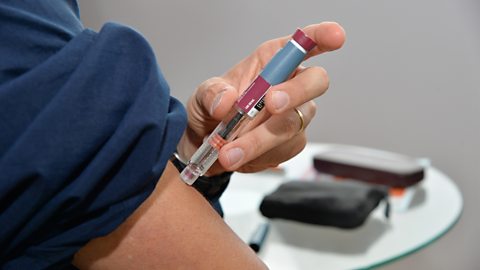Diabetes
If someone does not produce enough - or any - insulin to control their blood glucose concentration they have diabetes.
Symptoms
- Glucose in the urine ÔÇô blood glucose concentration is so high that some is filtered out by the kidneys and passed into the urine
- High blood glucose levels
- Being thirsty
- The need to go to the toilet a lot
- Lethargy ÔÇô feeling tired/having low energy
| Type 1 diabetes | Type 2 diabetes | |
| Develops | Usually early in life. | In older people (a progressive disease linked to poor diet/lack of exercise/obesity). |
| Effect | Pancreas stops producing insulin. | Pancreas gradually produces less insulin. Insulin not as effective. |
| Treatment | Control carbohydrate intake. Injection of insulin. | Control carbohydrate intake and increase exercise in order to lose weight. Tablets. Injection of insulin. |
| Future | Increase in numbers of sufferers due to an increase in obesity. Becoming more common in young people. |
| Develops | |
| Type 1 diabetes | Usually early in life. |
| Type 2 diabetes | In older people (a progressive disease linked to poor diet/lack of exercise/obesity). |
| Effect | |
| Type 1 diabetes | Pancreas stops producing insulin. |
| Type 2 diabetes | Pancreas gradually produces less insulin. Insulin not as effective. |
| Treatment | |
| Type 1 diabetes | Control carbohydrate intake. Injection of insulin. |
| Type 2 diabetes | Control carbohydrate intake and increase exercise in order to lose weight. Tablets. Injection of insulin. |
| Future | |
| Type 1 diabetes | |
| Type 2 diabetes | Increase in numbers of sufferers due to an increase in obesity. Becoming more common in young people. |

Complications
If too much insulin A hormone produced in the pancreas that decreases blood glucose levels. is injected or not enough food is eaten regularly, the blood glucose concentration can drop too low and a hypoglycaemic attack (a ÔÇśhypoÔÇÖ) may occur, resulting in unconsciousness/coma.
If blood glucose concentrations remain too high over a long period (if the individual has been diabetic for a long time or their diabetes is undiagnosed or uncontrolled), serious long-term effects can arise.
Long-term effects
- Eye damage/blindness
- Heart disease
- Stroke
- Kidney damage
These complications are due to high blood glucose concentrations damaging the capillariesSmall, permeable blood vessels present in the organs of the body that allow the diffusion of substances like oxygen and glucose. that supply that part of the body.